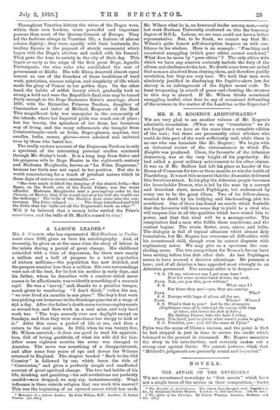MR. B. B. ROGERS'S ARLSTOPHANES.* WE are very glad to
see another volume of Mr. Rogers's admirable translation. (When we say " translation " we do not forget that we have at the same time a complete edition of the text ; but there are presumably other scholars who could do this part of the work sufficiently well, while there is no one who can translate like Mr. Rogers.) We begin with an historical review of the circumstances in which The Knights was produced. Cleon, the favourite of the Athenian
democracy, was at the very height of his popularity. He had added a great military achievement to his other claims.
It was as if Mr. Balfour had left his place as Leader of the House of Commons for two or three months to win the battle of Paardeberg. It was at this moment that the dramatist delivered this ferocious attack. In his play the Athenian people becomes the householder Demos, who is led by the nose by a corrupt and truculent slave, named Paphlagon, but understood by every one to be the great Cleon. Two of his fellow-slaves, wearied to death by his bullying and blackmailing, plot his overthrow. One of them has found an oracle which foretells that the favourite will have some day to yield to a rival who will surpass him in all the qualities which have raised him to power, and that this rival will be a sausage-seller. The conspirators find a man who fulfils these conditions, and the contest begins. The rivals flatter, coax, alarm, and bribe. The dialogue is full of topical allusions which almost defy translation, but Mr. Rogers has overcome all difficulties with his accustomed skill, though even he cannot dispense with explanatory notes. We may give as a specimen the con- cluding scene. The two competitors for Demos's favour have been setting before him dish after dish. At last Paphlagon seems to have secured a decisive advantage. He presents a hare; and of all dainties a hare appealed most strongly to an Athenian gourmand. The sausage-seller is in despair
" S. S. Oh me, wherever can I get some hare ? Now for some mountebank device, my soul. Peru. Yah, see you this, poor witless?
S. S. What care I ? For there they are !—yes, they are coming.
Perm Who? S. S. Envoys with bags of silver, all for me.
Pert. Where? Where? S. S. What's that to you ? Let be the strangers. (Paphlagon runs off to intercept the envoys with bags of silver, and leaves his dish of hare.) My darling Demos, take the hare I bring.
Peru. You thief, you've given what wasn't yours to give. S. S. Poseidon, yes : you did the same at Pylos."
Pyles was the scene of Cleon's success, and the point is that he had stepped in just in time to secure the credit which belonged to the general in command. Mr. Rogers examines the story in his introduction, and certainly makes out a
strong case against Grote. We cannot, however, think that "Mitford's judgments are generally sound and impartial."


















































 Previous page
Previous page